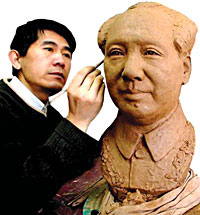 Within 24 hours of the withdrawal of nationwide blockades by the Maoists, at least 50 Nepalis were killed in battles throughout the kingdom. Peace remains as elusive as ever.
Within 24 hours of the withdrawal of nationwide blockades by the Maoists, at least 50 Nepalis were killed in battles throughout the kingdom. Peace remains as elusive as ever. On a busy afternoon at Asan this week a second cousin is spotted haggling over the price of fresh strawberries from Nuwakot. There are several women selling plates made out of sal leaves but a buyer can't find a regular supplier. In the commotion of the bajar fresh wares, novel display or attractive discounts compete to grab the attention of shoppers.
Traders recognise that consumers want to be surprised but not so much to lose their orientation. So they jolt them with novelty but keep them reassured with the promise of reliability.
The challenge is to design an appropriate mix of freshness and familiarity. This is difficult enough in business but in politics the task is much more daunting. The incumbency factor can make a party remain in power or lose it depending on its campaign strategy.
An armed insurgency loses its relevance if there is no violence but can't acquire legitimacy without renouncing violent behaviour. Baburam Bhattarai, skilled strategist that he is, must be in that dilemma: how to remodel his party to keep its young adherents on board without frightening away the democratic coalition of political parties, civil society and the international community.
The Maoist leadership needs time to clear the confusion. The second MoU with the seven party alliance last week gave them another opportunity to design a safe exit strategy from the vicious circle of armed insurgency, ruthless repression, alienation and rebellion. Sadly, some powerful and familiar interests are determined to be spoilsports.
US Principal Deputy Secretary of South Asian Affairs Donald Camp reiterated the need for reconciliation between constitutional forces. Chinese State Councillor Tan Jiaxuan hoped all constitutional forces would settle their differences. Other safe players also want these elusive constitutional forces to unite. But all this unity would do is push the Maoists into limbo and perpetuate the conflict.
The very term 'constitutional forces' is an oxymoron. Sovereignty of the people is the sole constitutional force in any democratic country. It is exercised by institutions and instruments created by the constitution in accordance with constitutional provisions and judicial traditions.
Since 1990 Nepalis are the only constitutional force of this country. All others, including the monarchy, parliament, and the courts are its creations charged with the responsibility of acting according to the letter and spirit of the supreme law of the land.
That stopped working the day parliament was dissolved under unusual circumstances four years ago. Whether the constitution is dead for good, comatose, in ICU or hostage to Article 127 is debatable. But everyone agrees it is ineffective. When the foundation has collapsed, there is no point building on it.
Amidst all this, the promise of a constituent assembly offers a ray of hope. It would be futile to expect that a fresh compact of the people will solve all outstanding issues in a single stroke but at the very least it proffers a possibility of peace.
Most Nepalis have no idea what a constituent assembly is supposed to deliver. Will it usher in a dictatorship of the proletariat or just legitimise monarchical democracy? Will it introduce inclusive democracy or perpetuate the status quo? These questions need to be debated in an atmosphere of give-and-take with an open mind. There can be no better forum to deliberate these issues than a parliament reinstated for the express purpose of preparing the ground for constituent assembly.
It will offer the right mix of innovation and ease to improve the visibility and value of reinvented Nepali Maoism in the marketplace of ideas. The alternative to messy parliamentary democracy is complete anarchy.



